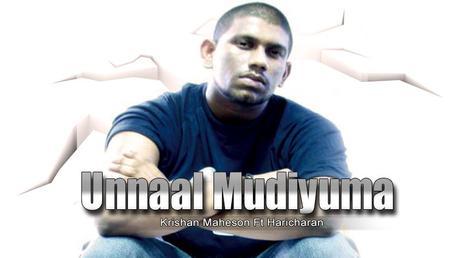Krishan (known to his fans as KingSouth KRISHAN) has been a trail-brazing pioneer Sri Lankan musician, going where no artists have gone before. He specializes in Tamil rap, being one of the foremost and pioneer Tamil rap artists in the world. Krishan's solo debut album 'Asian Avenue' (which includes his hit single 'J-Town Story') was the first ever Sri Lankan album to be launched by Universal Music India in 2006, actually preceding BNS’s 'CMB to Mumbai' which was released in 2007. To say the least, Krishan is a musician of immense talent and more so immense vision - he has also created a platform that offers support for new, up-and-coming Tamil rappers, and is currently creating and launching new rappers from Batticaloa, Trinco, Kandy, Colombo and Jaffna.
I make my way across to the Paramount 360 studio on Wednesday morning, the location of Krishan's production house where he has generously agreed to take some time to talk to me about the work he does, his session at Colomboscope and the creation of Sri Lankan Tamil identity and role models. I get to the studio a little earlier than scheduled, and this give me the opportunity to have a look around the space where the magic is created. Almost gives you goosebumps! Krishan arrives, and I am slightly startled having watched his video's previously and anticipating a Sri Lankan version of Pitbull or PDiddy (or whoever else the kids are listening to these days). Instead before me stands a casually dressed, relaxed guy with no airs about him - apologizing profusely for keeping me waiting and settles down before his setup to chat. This is my first realization that Krishan is more than just an artist - he is a visionary, a creator of opportunities not just for himself but for others and a pioneer of the industry and an ideal as a whole.

A still from 'J-Town Story'
Krishan talks to me for a while about what he will be talking about at Colomboscope (which I will keep under wraps in the interest of not giving too much away!) and then shares with me that he will also be speaking most specifically "from a Thamil musicians point of view, and the particular issues that we are facing". Krishan is half-Indian Tamil, half Jaffna-Tamil who was born and raised in Colombo. He is a banker from 9-5 and a musician all the time, and as we talk about this he shares with me how the evolution of the Sri Lankan Tamil music industry is far behind in comparison to that of the Sinhala music industry as the former is "predominately controlled by South India undoubtedly because of the amount of content that comes through South India". Thus Krishan's challenge and goal is not just to develop his own style and brand as an artist, but help the local Tamil music industry evolve and create opportunities where truly local content is created and consumed and more opportunities for people to make a full-time career in it become available.
Krishan tells me about his journey of exploring the genre of rap music, which he says goes back his youth in the early 90's where the "whole rap culture" really evolved. "I listened to a lot of House of Pain, Naughty by Nature, WuTang Clan" he tells me and then this led to writing and experimenting with writing his won pieces with his brother, Gadjen. Eventually they began to experiment with using their own language and the first single called 'J-Town Story' was penned in 2002 using the subject of a young Tamil boy against the backdrop of conflict-ridden Sri Lanka. He has continued on, releasing two more albums and now is"trying to strike the right balance between a 9-5 and then working til 12/1am" on music. But as Krishan unequivocally states with regard to his perusal of music "this is what I am inside, I am a creative person" and the aim is to take that as far as he can.
We go on to talk more about the work he is doing to expand the Tamil music industry in Sri Lanka, as the sheer volume being produced in South India overwhelms and distorts what is able to be done here. This leads us down the road of a fascinating chat about the Sri Lankan Tamil identity and the struggle to create one or understand what it means, as it always seems coloured or overshadowed but the South Indian Tamil culture. Krishan explains how in terms of music there is a perception of quality and accessibility that holds back the evolution of Sri Lankan Tamil art and this is one of the largest barriers to fight. However things are changing with this "digital tech savy generation" and their consumption, and he strongly believes that "we should be creating content to engage them to reach them". To illustrate what he is working on to harness this in terms of collaborations and working with South Indian artists he shows me his most recent music video 'Unnaal Mudiyum', and I was blown away by the standard of the quality of the production. Krishan warns me that this is not cheap, the cost of production and promotion is often a daunting task.
 We continued on to talk about many, many more things - including his inspiring new project working with young up-coming MC's from various parts of the country; and the the struggle to find opportunities to make money from your work in the music industry. However what really stood out to in our conversation was Krishan's vision to become an icon and idol. He explained to me the lack of Tamil icons for young people to look up to, and his drive to become something that can inspire and give them a goal to aspire to being. As he tells me "you have to evolve and change with time, especially with music you have to stay relevant or no one will respond". It is clear that Krishan is a visionary, and one that sees far beyond his own goals as an artist - but to what legacy and enduring frameworks he can create that will outlast him and his lifetime.
We continued on to talk about many, many more things - including his inspiring new project working with young up-coming MC's from various parts of the country; and the the struggle to find opportunities to make money from your work in the music industry. However what really stood out to in our conversation was Krishan's vision to become an icon and idol. He explained to me the lack of Tamil icons for young people to look up to, and his drive to become something that can inspire and give them a goal to aspire to being. As he tells me "you have to evolve and change with time, especially with music you have to stay relevant or no one will respond". It is clear that Krishan is a visionary, and one that sees far beyond his own goals as an artist - but to what legacy and enduring frameworks he can create that will outlast him and his lifetime.Krishan will be speaking on a panel entitled 'Surviving ‘The Arts’ Evolution – Tradition vs. Modernity' alongside Australian-Sri Lankan re-migrant to Colombo’s music scene Larry T Hill, internationally acclaimed actor Kaushalya Fernando and moderated by Actor and Director Peter d’Almeida. They will be talking about how with urbanization the aspirations of the city-dweller changes. How do changing social identities of class and what is perceived as high culture challenge the emergence of sub-cultures, experimentation, and the fusion of tradition with modernity? In this context, how do ethno-cultural identities contest for survival? You can purchase a ticket for the event here.
Follow Krishan on Twitter and Facebook and a big thank you to this wonderfully inspiring artist for not only taking the time to talk to me, but also for being so open and frank, and sharing with me his vision for this nation and the music industry.

